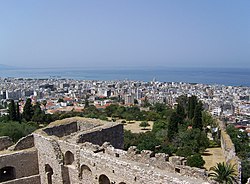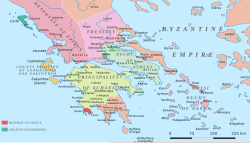Patras
Patra (Greek: Πάτρα) is the third biggest Greek city. Patra is in southwest Greece on the west coast of the Peloponnese. It is the capital of the prefecture of Achaia and also the capital of the Greek perifereia (district) of Western Peloponnese. 171,616 lived there in 2001. The total population of Patra, including all its suburbs, is over 200,000 people. Patra is a coastal city, so it has a big port. Patra's port connects Greece with east-facing Italian ports such as Bari, Brindisi and Ancona.
History
Patra developed in the third century BC. During the Roman period, Patra became an important city. In Patra Christianity arrived quite early, approximately in the first century AD, by St Andrew, who was martyred there. During the Middle Ages Patra was not very significant. Patra developed again after the Greek liberation from the Turks, in 1830 following the Greek revolution of 1821.
Sights
The most important site in Patra is the contemporary Bridge Rion-Antirion which links Peloponnese and Sterea Ellada. This bridge is located a short distance from Patra's center, in the district of Rio. Opposite Rio is Antirio and it ends at the bridge. Other significant sites in Patra are the church of Agios Andreas and the Apollon theater. The cathedral of Agios Andreas is the third biggest churches in Greece. Patra is known for its wines, with the famous and oldest Winery in Greece, Achaia Clauss founded in 1861.[1]
Patras Media
Patras at sunset from a hill NE of Dasyllio
Patras vista de un ferry
Ruins of the Roman stadium
Patras "Plateia Georgioy A" square, and, Theatre Apollo
Trion Symmachon Square and clock with the former hotel Metropolis in the background
- Archaeological museum of Patras.jpg
The entrance of the new Archaeological Museum of Patras
References
- ↑ "Achaia Clauss : Από Το 1861 Οινοποιεί | Επισκέψιμο Οινοποιείο". Archived from the original on 2017-10-20. Retrieved 2017-11-05.



